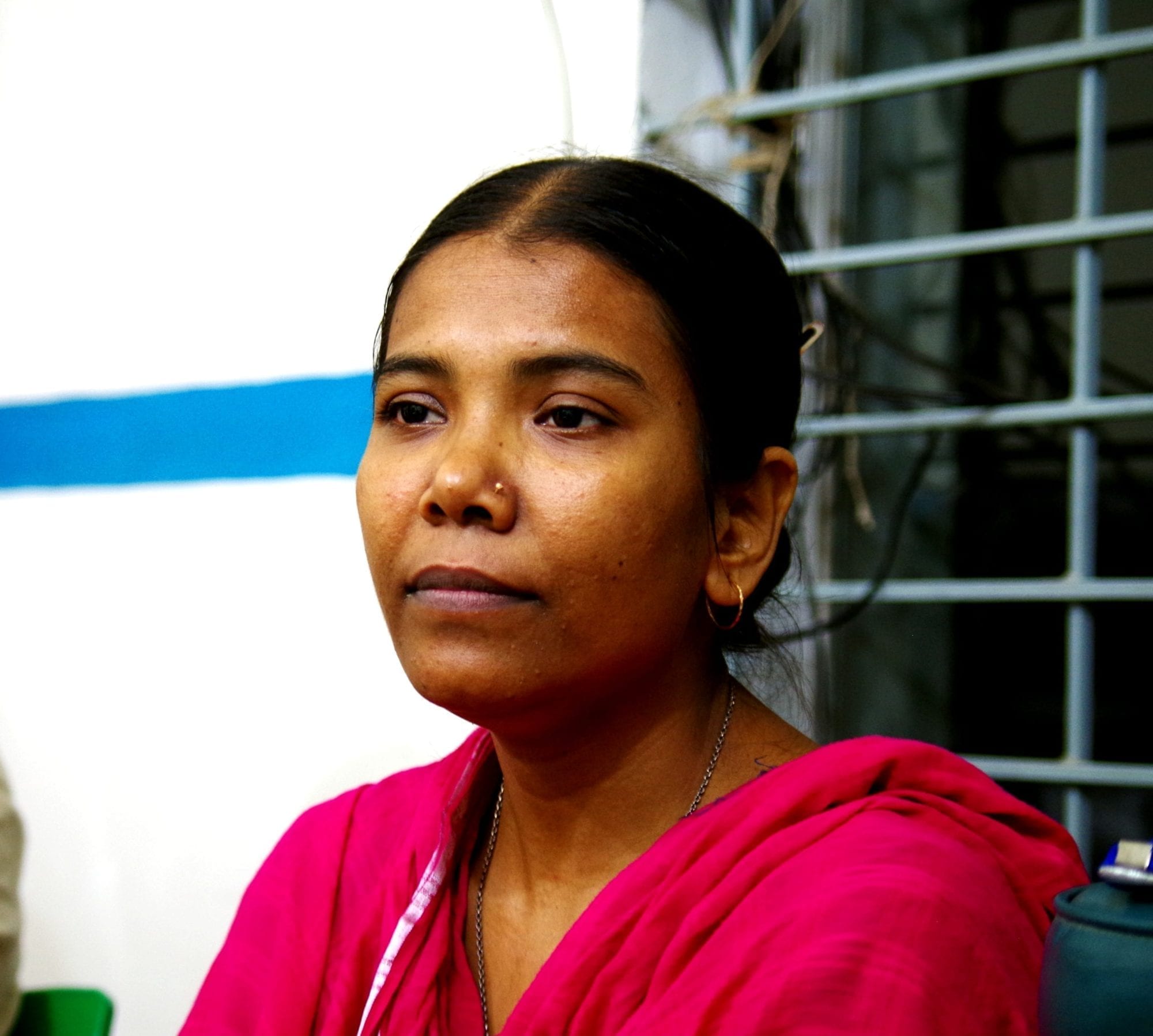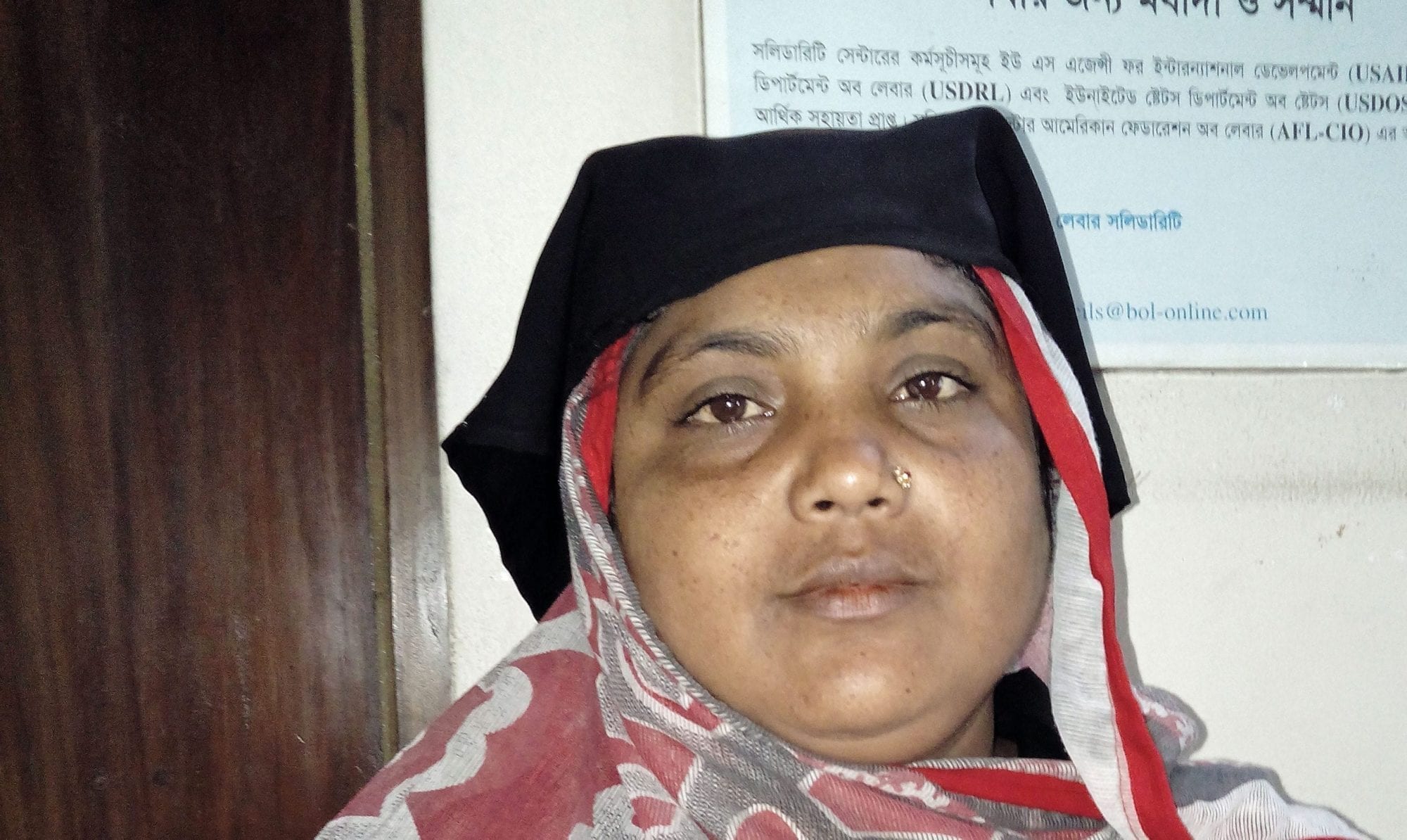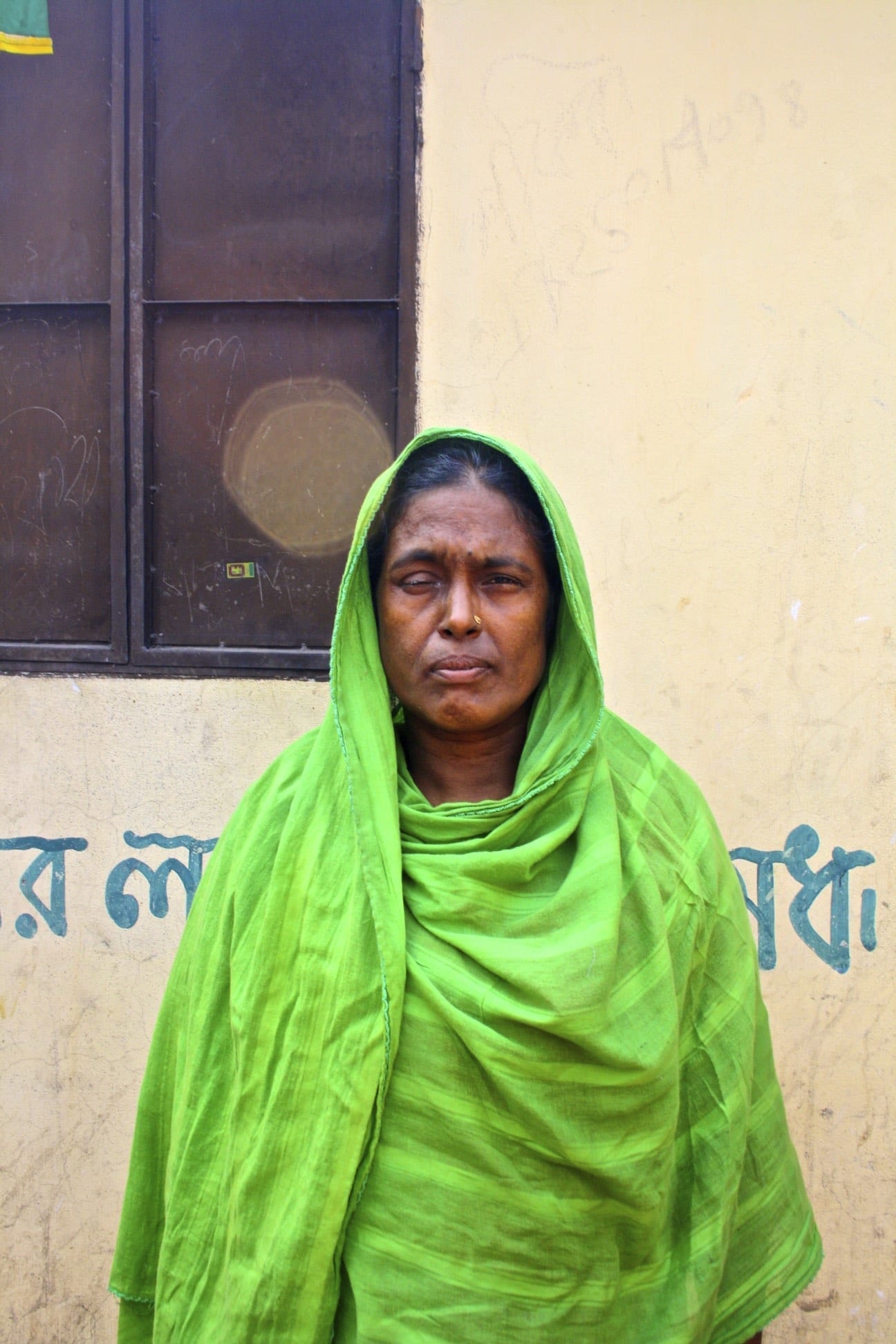
Apr 20, 2016
In Dhaka, Bangladesh, the conditions Sharina describes at the garment factory where she works can be summed up in three words: dangerous, unsanitary and exploitative. Wages are delayed. Legally required maternity leave is denied. Workers are sometimes forced to toil until 3 a.m. and are fired if they refuse. Bathroom facilities are so appalling workers have difficulty focusing on work because of the odor.
Sharina (not her real name) says her co-workers do not speak out about these issues, nor do they point out potentially hazardous electrical problems to their employer because they fear they will be fired. And each day, workers put their health and safety on the line because they have received no safety training and no safety protections.
In fact, says Sharina, 30, only when safety inspectors show up do managers distribute safety equipment like rubber boots, gloves and masks to workers, and put needle safety guards on sewing machines.
“Things would be better if we had a union,” says Sharina, 30. Workers could negotiate with management to receive safety training and avoid deadly tragedies, she says, adding that the more than 1,130 garment who died and the thousands who were injured in the Rana Plaza building collapse on April 24, 2013, would not have had to risk their lives for their jobs if they had been able to join together in a union and collectively push for safe working conditions. With a union, workers have the protection they need against being fired when standing up for improvements at work.
Solidarity Center staff interviewed Sharina, who has worked at the factory since 2012, on the eve of the third anniversary of the Rana Plaza disaster. The tragedy closely followed the November 2012 fire at the Tazreen Fashions factory that killed more than 112 Bangladesh garment workers and injured hundreds more.
Following the two disasters, the United States in June 2013 suspended its Generalized System of Preferences (GSP) agreement with Bangladesh based upon chronic and severe labor rights violations. Soon after, the Bangladesh government accepted union registrations with increasing frequency as workers organized and formed unions to address safety problems and low wages. (When workers forms unions, the Bangladesh government requires workers to register their unions before they are officially recognized.)
But after reaching a peak in January 2015, government approval of union registrations has dropped precipitously: In 2015, the government rejected 73 percent of union registration applications, according to data compiled by Solidarity Center staff in Dhaka. Rejections of workers’ desire to organize continues in 2016.
International outrage over the Rana Plaza and Tazreen disasters also prompted creation of the Bangladesh Fire and Building Safety Accord process, a legally binding agreement in which nearly 200 corporate clothing brands pay for garment factory inspections. Dozens of garment factories have been closed for safety violations and pressing safety issues addressed.
Since the Tazreen fire, 34 garment workers have been killed in fire incidents and 1,023 workers injured, according to data compiled by the Solidarity Center staff in Bangladesh.
Over the past few years, the Solidarity Center has held fire safety trainings for hundreds of garment factory workers. Workers learn fire prevention measures, find out about safety equipment their factories should make available and get hands-on experience in extinguishing fires.

Feb 5, 2016
I am Rehana Begum. I got married at age 13. After marriage, my education stopped. Now I have two children. When my in-laws tried to arrange a second marriage for my husband, we left our village home in Paikgachha, Khulna district, where my husband was a day laborer, and moved to Khulna city with our children.
After a few different jobs, I started working at Modern (Seafood Industries) factory as an IQF (individually quick frozen) line operator and I worked there three years and a few months. Everything was going well. But suddenly one day we heard that management would soon terminate a large number of workers. Two days later, we saw a notice on the factory’s main gate listing the names of workers selected for layoff. Management told us this is only the first phase.
The second list was soon posted, in August 2015. We were worried, wondering when our names would appear on the list. On September 11, I heard from one of my colleagues that I was terminated, but I didn’t believe it as there was not any notice. Finally, I heard from the office that I was terminated along with 30 other workers—but management didn’t give us any written documents.
Standing Strong Together
The next day, all of us who had been terminated—about 50 workers from two factories (Bright and Modern)—met in the home of a worker. From this home meeting we decided to meet with our factory owner. We selected and assigned eight workers, four from each factory, on behalf of all workers. I was one of them and all of us got training from the Solidarity Center and learned about our rights. If we failed in the negotiations with owner, we knew we could go to the Solidarity Center for legal help.
As per our plan, we went to the factory office to meet the manager. At first, managers selected two workers out of eight and offered them all legal payments. But we were strongly united, and they could not break us. The two workers came out of the factory and shared everything with us and all the workers became angry and some of them became violent and started shouting. But we stopped them and requested that everyone stay peaceful.
Meanwhile, watching the situation, the owner suddenly changed his mind and asked all workers to come inside the factory. The owner called one worker from each factory to list demands. I said we came to you for justice, for our legal rights. We want our service benefit. We were terminated without any notice when Eid-Ul-Azha (a four-day Muslim religious holiday) is coming.
After the meeting, management assured us it will try to give all workers service benefits within one week. I received Tk. 18315 ($234). Soon, all terminated workers got their payments. It was really a great victory for us.
I have been working in Jalalabad Frozen Food Ltd. as an IQF line operator since October 2015. After working these couple of years as a shrimp processing plant worker, I now feel more confident and feel myself stronger than ever. I am also happy with my family. My husband works as a day laborer and helps me doing my job. My children are studying in school.

Nov 21, 2014
November 24 marks the two-year anniversary of the deadly fire at Tazreen Fashions Ltd. in Bangladesh that killed 112 garment workers. Since then, at least 30 garment workers have died in factory fires and 844 have been injured in 68 incidents, according to data collected by Solidarity Center staff in Dhaka, the capital. Many of the survivors and their families say they have received little or no compensation, and many survivors are unable to work again.
“Things are getting much, much worse for me,” said Shahanaz, who sustained critical injuries, including loss of vision in her right eye, while fleeing the burning building. “With all of the pain I am in, I can no longer pray while standing.”
Shahanaz is one of nearly a dozen garment workers and family members the Solidarity Center profiled last year. Solidarity Center staff in Dhaka recently visited the workers again, and found that, like Shahanaz, their health and financial situations have deteriorated.
Five months after the Tazreen fire, another 1,100 garment workers in five factories were killed and another 2,500 people were injured when the Rana Plaza building collapsed.
Millions of garment workers, up to 90 percent of whom are women, have made Bangladesh the second largest producer of apparel globally, and 80 percent of the country’s foreign exchange depends upon the industry. Garment workers have toiled for decades in hazardous working conditions with few worker rights. After the Tazreen and Rana Plaza disasters shocked the world, these worker rights violations could no longer be ignored.
Following the Rana Plaza collapse, the United States suspended its Generalized System of Preferences (GSP) agreement with Bangladesh based upon chronic and severe labor rights violations. In the weeks after the suspension, the Bangladeshi government dropped charges against two prominent garment union leaders. It has since registered more than 200 unions representing more than 50,000 workers. By contrast, only two garment unions were registered between 2010 and 2012.
Yet some 25 percent of new unions are in factories that have closed or are inactive due to anti-union activities, according to Solidarity Center data. Further, in at least 46 factories with unions, workers have faced severe anti-union violence, mass terminations and/or threats.
International retailers have joined together in two separate groups to improve safety at factories where they contract work. More than 175 international retailers signed on to the Bangladesh Accord on Fire and Building Safety, a legally binding agreement negotiated with the global unions, IndustriALL and UNI. Another 26 primarily U.S. and Canadian companies signed the Alliance for Bangladesh Worker Safety, which is not legally binding. After inspecting some 1,700 of Bangladesh’s 5,000 garment factories, the Accord and the Alliance identified 33 factories in which safety issues are so serious that they recommended production be suspended because of the risk to workers.
However, questions remain about who will pay for the cost of repairs and who inspects the remaining factories that neither the Accord nor Alliance says are their responsibility. The Accord and Alliance claim 1,800 factories are under their purview, but a recent study estimated the total number is between 5,000 and 6,000 factories and facilities.
The Solidarity Center has had an on-the-ground presence in Bangladesh for more than a decade. This year, following Solidarity Center fire safety trainings, garment workers have used their new skills to identify and correct problems at their worksites. Joni and Rabeya, president and general secretary of B. Brothers Garments Co. Ltd. Workers Union, found 15 expired fire extinguishers and located electrical hazards in their factory, such as faulty electrical wiring. They raised these fire safety issues with management, which has since corrected some of the issues.
Recognizing that workers who freely form unions can better advocate for job safety and decent wages, the Solidarity Center believes there is need for:
• A clear and transparent trade union registration process.
• Quick resolution of unfair labor practices by the Bangladesh Labor Department, with penalties for employers who engage in them.
• Development of an independent alternative dispute resolution mechanism in the face of inefficient labor courts



